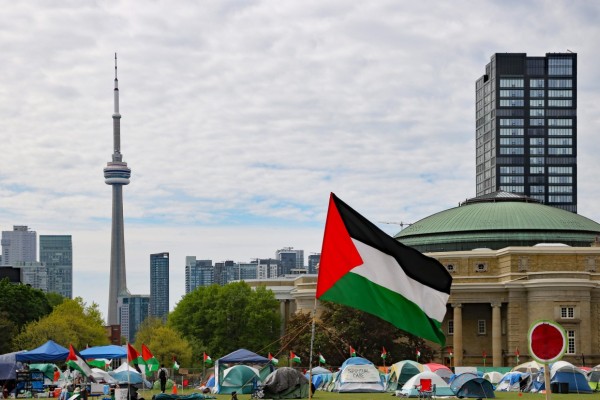High Schools Against Israeli Apartheid
In July 2005, 171 Palestinian civil-society organizations issued a call to the “international civil society organizations, and people of conscience all over the world, to impose broad boycotts and implement divestment initiatives against Israel, similar to those applied to South Africa in the apartheid era.” This call came after 57 years of ethnic cleansing, 38 years of military occupation and one year after the International Court of Justice issued its advisory opinion declaring Israel’s apartheid wall to be illegal under international law.
The Palestinians issued this call for boycotts, divestment and sanctions (BDS) following the failure of the UN and the international community to provide protection and solutions to the Palestinians. And responses were not late in coming. Unions throughout the world issued decisions to adopt the BDS campaign and to work actively on raising awareness about human-rights violations and war crimes committed by Israel. It was in this spirit and environment that High Schools Against Israeli Apartheid, or HAIA, was created.
Taking Stock of the Problem
HAIA was founded in a Toronto alternative high school early in the winter of 2007, when a small group of concerned students got together to take action against Israeli apartheid. From the beginning, HAIA’s goal was to educate peers about Israel’s true nature by exposing the misconceptions. When the state of Israel was created in 1948, three quarters of the indigenous population of Palestine was expelled and more than five hundred villages were destroyed, creating one of the world’s biggest refugee situations. Today there are around seven million Palestinian refugees – the world’s largest refugee population. To this day, refugees are forbidden to return to their homes – a violation of international law and a breach of UN Resolution 194.
Canada has a long history supporting Israel. Canada was the first government to cut aid to the Palestinians after Hamas won the Palestinian elections. As well, Canada blindly supported Israel’s aggression against Lebanon and ignored the war crimes Israel committed during the war, which led to the deaths of more than 1,100 innocent people. This year, Prime Minister Stephen Harper took part in celebrating Israel’s sixtieth anniversary, reiterating his support for Israel and totally ignoring the fact that the creation of Israel was accompanied by large-scale ethnic cleansing, the effects of which people are still suffering from today.
“The Student School” is a small high school with 185 students and eight staff. The school is unique in the way it operates. In addition to academic issues, the school focuses on raising students’ awareness about social injustice. Students are encouraged to participate in decision-making processes that happen in student council meetings. Every other week, the entire school meets for council during one 75-minute-long period. Here, students can make announcements, move motions and form committees. All motions have to be voted on. When it comes to voting, teachers and students both have an equal vote.
High School Students Take Action
It was at such a regular council meeting that one student brought forth a motion to start a committee in solidarity with the Palestinian people. Except for a few abstentions, the motion, which included recognition of Israel as an apartheid state, passed unanimously. In subsequent council meetings, during which members of HAIA would give updates about the humanitarian crisis in Palestine, a motion was passed to invite members of the Coalition against Israeli Apartheid (CAIA) to give a presentation. Following a powerful, informative presentation, a motion was passed to start a subcommittee of CAIA. As the group grew in popularity, so did the movement.
In the fall of 2007 HAIA picked up momentum. The entire school watched the educational documentary Occupation 101. After the screening, a debate took place. As a part of its outreach campaign to educate peers, HAIA received a designated wall in the school and an information desk. HAIA also teamed up with the mural committee to start banner productions for protests. During the fourth annual Israeli Apartheid Week (IAW) 2008, HAIA held its founding conference, which was attended by forty high-school students from seven different high schools across Toronto. To support Palestinian workers and farmers, the school began selling traditional scarves (keffiyeh) and fair-trade Palestinian olive oil.
Organizing Toronto Schools
Members of HAIA have been invited to other high schools to discuss Israeli Apartheid. The group has held fundraisers to support the people of Gaza, who live under siege. In May, 2008, as part of the commemorative events to mark sixty years of “Nakhba” (catastrophe), HAIA united with SAIA (Students Against Israeli Apartheid) to hold a youth day of action.
The school, at HAIA’s urging, joined other BDS campaigns in the city. For example, the council voted to boycott Chapters Indigo bookstores because of the financial support that their majority shareholders, Gerry Schwartz and Heather Reisman, give to the Heseg Foundation for Lone Soldiers.
HAIA is now working on expanding the movement to other schools, and is in the course of formulating strategies and action plans to increase involvement of Canadian youth in the struggle against apartheid in Palestine, as well as in social-justice issues and international solidarity in general. HAIA’s goal is to mobilize the youth and get them involved in struggles for just causes, like the issue of Palestine and the struggle of the Indigenous peoples of Turtle Island. To learn more about HAIA and to get involved, please e-mail us at: haia [at] caiaweb.org.
This article appeared in the September/October 2008 issue of Canadian Dimension (Canadian Students).









